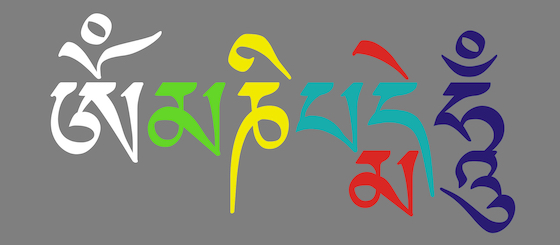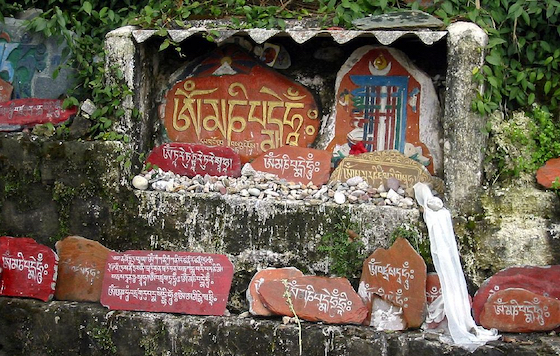His Holiness the Dalai Lama explains the meaning of Om mani padme hum.

The mantra Om mani padme hum. The six syllables are Om ཨོཾ mani མ་ཎི padme པ་དྨེ hum ཧཱུྃ.
A Talk On Om Mani Padme Hum By H.H. the Dalai Lama
It is very good to recite the mantra Om mani padme hum, but while you are doing it, you should be thinking on its meaning, for the meaning of the six syllables is great and vast.
Om
The first, Om is composed of three letters. A, U, and M. These symbolize the practitioner’s impure body, speech, and mind; they also symbolize the pure exalted body, speech, and mind of a Buddha.
Can impure body, speech, and mind be transformed into pure body, speech, and mind, or are they entirely separate?
All Buddhas are cases of beings who were like ourselves and then in dependence on the path became enlightened; Buddhism does not assert that there is anyone who from the beginning is free from faults and possesses all good qualities. The development of pure body, speech, and mind comes from gradually leaving the impure states and their being transformed into the pure.
How is this done?
The path is indicated by the next four syllables.
Mani
Mani, meaning jewel, symbolizes the factors of method—the altruistic intention to become enlightened, compassion, and love.
Just as a jewel is capable of removing poverty, so the altruistic mind of enlightenment is capable of removing the poverty, or difficulties, of cyclic existence and of solitary peace.
Similarly, just as a jewel fulfills the wishes of sentient beings, so the altruistic intention to become enlightened fulfills the wishes of sentient beings.

Mani stones outside the Tsuglagkhang Complex, near the home of His Holiness the 14th Dalai Lama, McLeod Ganj, Dharamshala, India. Photo by Liz Highleyman, Creative Commons, https://bit.ly/3fuozRB
Padme
The two syllables, padme, meaning lotus, symbolize wisdom. Just as a lotus grows forth from mud but is not sullied by the faults of mud, so wisdom is capable of putting you in a situation of non-contradiction whereas there would be contradiction if you did not have wisdom.
There is wisdom realizing impermanence, wisdom realizing that persons are empty of being self-sufficient or substantially existent, wisdom that realizes the emptiness of duality—that is to say, of difference of entity between subject and object—and wisdom that realizes the emptiness of inherent existence.
Though there are many different types of wisdom, the main of all these is the wisdom realizing emptiness.
Hum
Purity must be achieved by an indivisible unity of method and wisdom, symbolized by the final syllable hum, which indicates indivisibility. According to the sutra system, this indivisibility of method and wisdom refers to wisdom affected by method and method affected by wisdom.
In the mantra, or tantric, vehicle, it refers to one consciousness in which there is the full form of both wisdom and method as one undifferentiable entity.
In terms of the seed syllables of the five Conqueror Buddhas, hum is the seed syllable of Akshobhya—the immovable, the unfluctuating, that which cannot be disturbed by anything.
The six syllables: Om Mani Padme Hum
Thus the six syllables, om mani padme hum, mean that in dependence on the practice of a path which is an indivisible union of method and wisdom, you can transform your impure body, speech, and mind into the pure exalted body, speech, and mind of a Buddha.
It is said that you should not seek for Buddhahood outside of yourself; the substances for the achievement of Buddhahood are within.
As Maitreya says in his Sublime Continuum of the Great Vehicle (Uttaratantra), all beings naturally have the Buddha nature in their own continuum. We have within us the seed of purity, the essence of a One Gone Thus (Tathagatagarbha), that is to be transformed and fully developed into Buddhahood.
First published in Kindness, Clarity, and Insight by The Fourteenth Dalai Lama His Holiness Tenzin Gyatso, translated and edited by Jeffrey Hopkins, co-edited by Elizabeth Napper. Snow Lion Publications, 1984. Reprinted here by arrangement with Shambhala Publications, Inc., Boulder, CO. www.shambhala.com
Video on the meaning of Om Mani Padme Hum
Here’s a video from 2013 of His Holiness the Dalai Lama answering a question about the meaning of the mantra Om mani padme hum.

Thank you so much for these explainations!!!
Looking forward to receive more posts
Best wishes
Caroline
Dear Caroline, We’re so happy that you liked the blog post. You may also enjoy this one on the meaning of various mudras: https://tnp.org/mudras-meaning-of-sacred-hand-gestures/ Sending you very best wishes. Thank you for supporting Tibetan Buddhist nuns.
Thank you for this post, it helped me very much. Bless you all.
Maria
Bahut bahut dhanywad jankari dene ke liye🙏🏽.
Mujhe kisi ne bataya tha ki is mantra ke jaap saans ko andar lete huye karna chahiye.. kripya adhik jankari den.. Dhnaywad🙏🏽. (Translation: Thank you very much for giving information🙏🏽.
No one told me that this mantra should be chanted while walking.. please give more information.. Thank you 🙏🏽.)
The meaning for me has always been “To prepare a mind that is at one with the universe” this is the real, foundational meaning of the symbolism of the words.
The jewel in the lotus is the ordered consciousness which transmits divine light. The lotus is a special case of the tree under the sun. Every facet of a jewel, every facet of the manifest world transmits the light of meaning in this regard. This is why a tree can lead to enlightenment which is also symbolized by the lotus.
I talk about these things in my first book “The Textbook of the Universe: the Genetic Ascent to God” 20 years ago.
Thank you for this
bless you all
Hunny
Thanks for the beautiful explanation of the concept. Loved it.
Very helpful, thank you. I just returned home from a wonderful trip to Northern India where I saw the faded prayer Stone in a river and I am interested in translating it. It holds some of the same elements but seems different. Is it normal for a prayer Stone to say something similar to this but different? It looks like Ohm padme [something else] hum. Are you willing to help me with this quest?
Dear Steve, thank you for your comment and we’re glad that you found this blog post helpful. We’d be happy to try to identify the mantra on the mani stone you found. You can email us and send a photo to info@tnp.org. Very best wishes.
Pingback: Affirmations for Pregnancy to Stay Grounded - Life Gets Greener
jag sjunger om mani padme hum flera gånger per dag.jag spelar in det.så jag kan lyssna på mig själv om igen.jag har satt upp en lapp på min ytterdörr och balkongdörr och sovrumsfönster.på lappen står det.om mani padme hum.det ger mig positiv energi.Aum shanti.shanti.shanti. frid i kroppen.talet.sinnet. må ljuset i mitt hjärta lysa med kraften av 1000solar.jag vill bli en ledstjärna för alla dem som vandrar i mörker.må min kärlek blomma och öppna sig som skönheten 1000bladiga lotusblomma.må lyckan vara min för evigt.Aum.
I love this mantra and I have a strong connection with quan yin. She appears to me many times. Forgiveness can be a difficult thing..this mantra calms the mind..I play it daily on youtube and i recite it often while driving..i also silently chant it while i am swimming.
Thank you for the invaluable explanation of this divine chant. I feel more connected now.